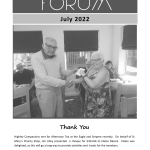webdev
Highley Forum -July 2022
Thought for the Week – 3rd July 2022
Religion and politics
How far should religious figures be involved in politics? The father of Theresa May was a vicar; he would not allow his daughter to display election posters in the vicarage as he thought these might act as barriers between him and his parishioners. At the other end of the spectrum was Bruce Kent, the former chair of CND who has just died He served as army officer during his national service in the 1950s and then was ordained a priest in the Roman Catholic church. He could have achieved high ecclesiastical office, but he set it aside for his commitment to what he understood to be the Gospel of Christ; in particularly, a passionate belief that possession of nuclear weapons was a moral evil. He worked tirelessly for nuclear disarmament. Eventually he resigned from the priesthood, convinced that his calling as a Christian meant he could not in conscience abide by the strictures of the church. Bruce Kent had no time for those who though religion and politics could not mix; for him, his faith had to be lived out in the political world. In vicar-speak, he believed he was called to speak with the prophetic voice, just as in Old Testament times, the prophets spoke truth to the corrupt rulers of Israel and Judah.
Whilst I incline to the views of Theresa May’s late father on trying not to impose my own views on others, I always fully supported Kent’s right as a Christian to become involved in politics, although I did not share his analysis. I am glad today that Christians are still prepared to enter the political fray and argue for policies or parties based on their Christian convictions, even when I disagree with them. What I do ask is that they do so with humility, however strong their own convictions. I have always been impressed by the attitude of a Quaker, who I once heard praying. Quakers are famously pacificists, I was in no doubt he stood on nuclear weapons, but he finished his prayer by asking for humility, in case he was wrong and those who disagreed with him were right. Perhaps this is an attitude many politicians could learn from.
Rev David Poyner
Thought for the Week – 26th June 2022
Forest Church
Last week, we held another “Forest Church”. It is not a good name; it rarely takes place in forests and it is not really church, at least as most people understand it. It does involve finding inspiration to respond to God from being outdoors, but beyond that there is no set pattern. Previously I have held events in Billingsley and Glazeley churchyards, largely because there was a building close at hand in case of rain. The activity depends on who turns up; we have had meditations, music and an informal communion. The one thing common to all events is silence, to listen to the natural world and hopefully, through that, also to God. The most recent event was at New England, now a quiet place on a brook, once a hamlet. We finally moved away from a church into at least a wood! I spoke about the history of the area and the communities that had flourished there or benefitted from it; the first sewerage treatment work in Highley was opened there before the First World War. We had a Bible reading, a passage from Ecclesiasticus, praising the contributions of craftsmen and manual workers. However, this does not mention God and I think I only used the G-word once, as we reflected on what we had seen and felt during a time when people did their own exploration of the area. But God is bigger than we can possibly imagine and can reach us in ways we do not understand. Those of us who came spoke about the peace and the tranquillity we experienced; perhaps the next time we hear the phrase “the peace of God”, the evening at New England will give that extra meaning.
Rev David Poyner
Thought for the Week – 19th June 2022
No Golden Ticket
I have been much struck by the tributes to the Rev Richard Cole, TV and radio presenter, former pop star and Church of England vicar, who has retired from parish ministry at the age of 61. The journalist Caitlin Morgan has written “I am as godless as a person can be, but I admit now, when I have gone through bad times… I have often wished he preached in a church near me so I could go and take part in something comforting. Cole’s life, the struggles, the grief, but also the impulse towards joy and love, make me trust his take on faith, charity and generosity…”
And to bear that out, some of his words, given a couple of weeks ago in an interview with the Daily Express, about his reaction to the death of his partner, David, when the interviewer suggested it was unfair: “It’s not about fair. What you get is not about your just deserts, fate, chance or whatever. I never thought being a person of faith meant you got a golden ticket. When David died, I didn’t feel I had been cheated out of anything. I just thought it was a terrible thing.”
Rev David Poyner
Thought for the Week – 12th June 2022
The Falklands
This coming Tuesday, 14th June, marks the 40th anniversary of the end of the Falklands War, the conflict between the UK and Argentina. I suspect for those of us of a certain age, this is poignant. I was a 20-year old university student at the time. A few weeks before the war broke out, I was at the Imperial War Museum in Duxford when, coincidentally, a Vulcan bomber was brought into land; retired from service to join the museum collection. Whilst the Cold War was very active at that time, this seemed a throw-back to another age. Little did I imagine thatsix weeks later one of the Vulcans still in service would be used in anger, flying half-way round the world to bomb an airfield on the Falklands. For the first time in my life, I lived in a country that was, effectively at war, albeit in a conflict very remote from Cambridge where I was living. As students, we would wait on the nightly briefings from the Ministry of Defence, with a mixture of anticipation and fear.
War always raises difficult questions for people of faith. Christ chose a path of non-resistance to the powers of his day, to win a once-for-all victory over evil. Even in that simple sentence, there is a clash between actions of peace and words that speak of war. The same Jesus who went peacefully to his death used a whip to clear the temple of money-traders. Whilst there are Christian traditions that reject war under any circumstances, the majority of voices accept that in a fallen world, sometimes we do need to resort to arms to prevent or correct injustice. Whilst there were some dissenting voices at the time, I suspect most would now accept that the conflict in the Falklands was a just use of force, to liberate the islanders and reverse an act of violence. I think it was Oscar Wilde who wrote “the truth is rarely pure and never simple”; sometimes we have to muddle through moral decisions as best we can and pray that God will forgive us if we get them wrong.
Rev David Poyner

